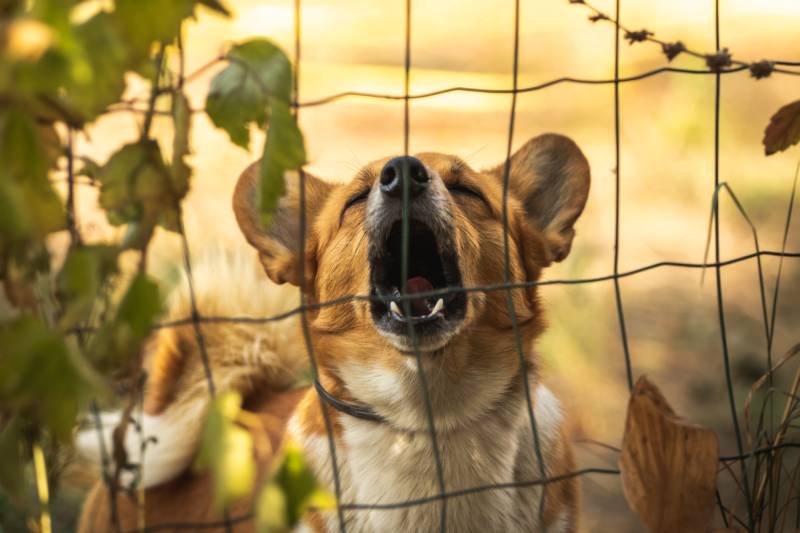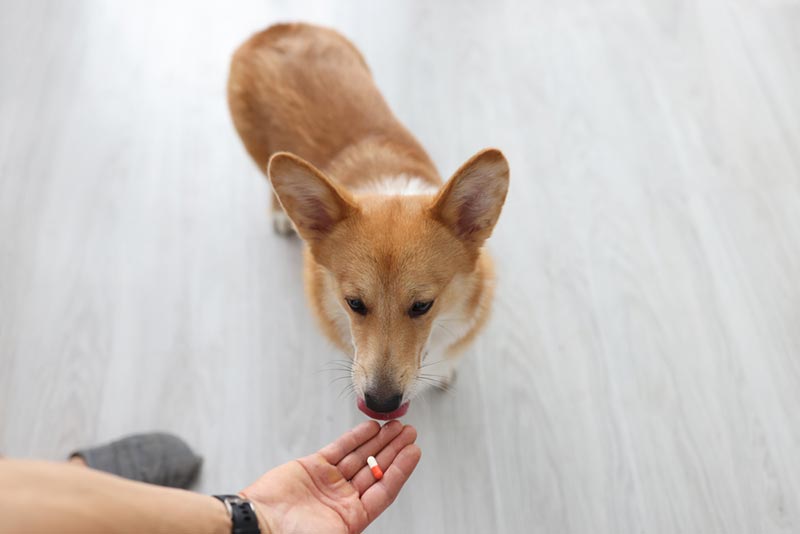Click to Skip Ahead
There are two types of Corgi: Pembroke and Cardigan Corgis. The two breeds are very similar in a lot of respects, including in their propensity to bark.
Corgis naturally bark a lot. They were bred as working dogs. Specifically, they were bred to herd livestock. They barked to command and control the herd, but they also barked to warn of potential predators and to alert shepherds to any dangers.
Pet Corgis are not required to tend flocks, but they do retain some of the properties that made them such good herding dogs, and this includes barking. Fortunately, with good socialization, regular exercise, and adequate training, it is possible to reduce the amount that a Corgi barks, or at least to control when your dog will bark.
Read on for more information about this wonderful breed, especially popular with Queen Elizabeth II, and what you can do to try and control the level of barking of a Corgi.

About the Corgi
Corgis are very people-oriented, which, when combined with their intelligence, makes them easy to train. The breed does enjoy exercise and is strong and lively. The Corgi is friendly and loyal but isn’t overly needy and can be stubborn.
Owners can be taken by surprise by how quick and strong the breed is, and while your Corgi won’t demand attention every hour of the day, you should expect to provide regular walks, offer active playtime, and consider enrolling with your Corgi in agility and other canine sports classes. Although the Corgi has plenty of energy and enjoys brisk walks, its short legs prevent it from being able to run too fast, so it isn’t a suitable breed to accompany you on a bike ride.
The breed does require fairly regular grooming to protect the double-layer coat and because it sheds daily, with heavy shedding during early summer. Brushing prevents the hair from covering the furniture and getting all over the house. It also keeps the dog comfortable and prevents matting.

Do Corgis Bark a Lot? Why?
Having been used to guard and protect livestock, as well as to herd them, the Corgi is still a good guard dog. It has a loud bark that is used to get the attention of its owner while alerting them to any potential danger. And, unfortunately, some Corgi owners do report that their dogs sound an alert for everything, whether it is an approaching postman or a change in the wind.
Barking is the main way that dogs communicate with us, so it’s not surprising that highly social dogs like Corgis bark more than other dogs from other breeds. Sometimes, Corgis bark because they are happy and excited. Other times, they bark as a way to burn excess energy. They might bark to communicate that they’re hungry or want to play or go outside.
Corgis also can bark because they are angry, scared, or stressed. With time, you’ll get to know your dog’s different barks and understand what it wants when it barks.
Can You Teach a Corgi Not to Bark?
It is possible to minimize the amount that a Corgi barks, but you should never expect any breed of dog to be completely silent. Barking is one of a limited number of ways in which a dog can communicate with its owners and others.
With that said, ensure that your Corgi has plenty of physical and mental stimulation. A tired and entertained dog is less likely to bark, and especially after intense exercise, your Corgi is more likely to want to curl up and sleep rather than perform guard duties.
Early socialization and ongoing training can also help. Teaching the “quiet” command will be beneficial. Provide positive reinforcement when the dog is quiet and use the word “speak” when it barks. When the barking stops, give a treat and praise, paired with the word “quiet”. If they start barking again, ignore them until they stop. You will have to be consistent with this training to have the best chance of success, but many owners can use this technique to reduce the amount of barking from their Corgis.
Early socialization means introducing the dog to new people and new situations while it is still young. Not only will this desensitize them to the specific people they meet, but it will give them more confidence when they are met with new and unexpected scenarios later in life.
Good training shows your dog that they should look to you for leadership and that you can protect them and keep them safe. This means that they should be less inclined to feel the need to protect you and your family. If they spend less time guarding, they will have fewer occasions when they feel the need to bark a warning.

Meeting Your Corgi’s Needs
Corgis are chatty dogs, but happy and healthy Corgi’s shouldn’t bark nonstop. The first thing to look at is whether your dog is getting enough exercise and attention. Corgis are built to work on a farm all day, so they have a lot of energy to burn! If they don’t have enough time running and playing, they often get bored and restless. This can lead to more barking.
Corgis are also social dogs. They need lots of attention from humans or other dogs. If your dog spends a lot of the day alone, or if you mostly ignore it throughout the day, barking might be a way to get attention from you.
It’s also worth considering if your dog’s barking is a sign of distress. Sometimes, barking is a sign of anxiety, pain, or other sources of unhappiness that aren’t obvious. If your Corgi is barking in response to a problem, it’s important to solve the problem instead of trying to force it to be quiet.
Training to Stop Barking
Along with meeting your dog’s needs, you can also use healthy training methods to help your dog stay quieter. Many dogs bark when a neighbor passes by or when someone knocks on the door. These “stranger danger” barks can be eliminated through training. Help your dog learn a better response to a knock on the door—like going to find you, sitting down, or grabbing a toy or pillow. Praise and reward your dog for proper responses.
You can also train your Corgi with a “quiet’ command that helps them calm down and stay quiet if they start barking at a bad time. Many dogs get “quiet” faster if they learn how to bark on command first

Bark Control Methods to Avoid
It’s totally possible to reduce your Corgi’s barking, but only by certain methods. There are lots of “tricks” for getting rid of barking that don’t work or aren’t safe for your dog. Fear-based methods, like shouting, punishments, and shock collars, tend to backfire. Instead of making your dog quieter, these methods make many dogs more aggressive.
Ignoring your dog is another method that doesn’t reduce barking. Instead, you can reduce barking by meeting your dog’s needs and training it in a healthy way.
Frequently Asked Questions (FAQ)
Can Corgis Be Left Home Alone?
Corgis do have a level of independence that means they can do well when left alone, although you should never leave your dog for more than 8 hours at a time. If you will need to leave your Corgi for long periods, start with shorter times and build up gradually. Ideally, this should start in puppyhood.
Provide the dog with their own space, ensure they have plenty to do while you’re out, and leave them alone for 15 minutes. Don’t instantly fuss over them when you get back but carry on as normal. Repeat this for a few days, before going out for 30 minutes.
Again, repeat until the dog gets used to it, and then go out for an hour. Continue increasing the time you leave them until you can eventually leave them for 4–5 hours.

Do Corgis Like to Cuddle?
Every individual dog is different, but Corgis are known to be affectionate dogs, so there is a good chance that your Corgi will enjoy some cuddles. Some won’t enjoy cuddling, however, and you shouldn’t force a dog to cuddle if it doesn’t want to. Most dogs prefer the act of snuggling up close rather than being confined in a cuddle.
Is A Corgi Easy to Train?
Corgis are very intelligent, and they are people-oriented. This combination means that your Corgi will have the brains to learn new commands and the heart to please you by doing what you ask. Start training as early as possible, be consistent, and use positive reinforcement techniques to enjoy the best training results.

Are Corgis Chewers?
Again, this depends on the individual dog, but Corgis do have something of a reputation for being big chewers. In any case, most dogs like to chew occasionally, and it is a good idea to ensure that your dog has at least one toy or something to chew, especially when you’re not at home.
If your dog has an overwhelming desire to chew and nothing has been provided, it may look for other items to chew. If your dog is chewing furniture or other items, ensure that they have adequate physical exercise and mental stimulation and that you leave them with something they are allowed to chew when you are out of the house.
Conclusion
Corgis are popular dogs. The breed is skilled at herding and guarding livestock, and it makes a loving and loyal family pet. It is fun, does require regular exercise, but can be prone to barking. Some owners report that their Corgis have big barks and use them regularly. Ensure good socialization, regular training, and adequate physical exercise to try and minimize the amount of barking from your dog, but be prepared for at least some barking because it is a natural response to certain stimuli, for all dogs.
Featured Image Credit: Bachkova Natalia, Shutterstock












